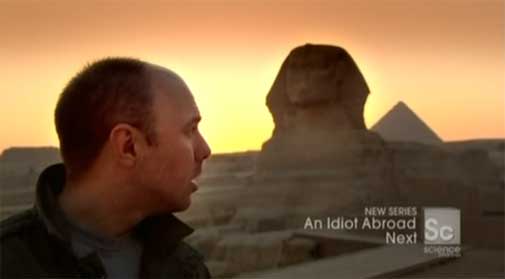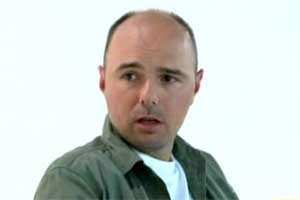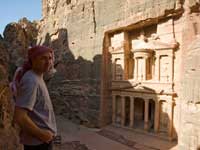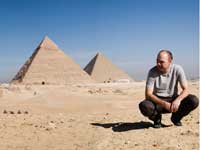
Saturday's Science Channel marathon showing of An Idiot Abroad (2:30-11 p.m. ET) gives viewers the chance to catch up on episodes they missed, or to be introduced, in one massive dose, to a TV travel host with a unique difference. He hates to travel...
Until viewing the new travel documentary series An Idiot Abroad, by Ricky Gervais and Stephen Merchant, I had never noticed a now-obvious niche left completely unexploited by the current travel show format.
Here I had thought they'd done it all, exhausted every character, and delivered something for every type of fan.
We've got Anthony Bourdain, the slick, bad boy foodie author who dines with sultans and street vendors alike.
And Andrew Zimmern, the hefty, gregarious bald man with no gag reflex, who crosses continents to savor a tasty bull testicle ceviche.
And let us not forget PBS's Rick Steves, whose straight-laced, uber-geeky approach is somehow strangely comforting and addicting. But as varied and unique as these hosts are, they all share one fatal flaw: they love to travel.

Enter Karl Pilkington, a "typical Little Englander" with a high school education. And also with, as Gervais describes him, "a head like a f#@king orange." Earning fame on both the record-breaking podcast and animated HBO version of The Ricky Gervais Show (9 p.m. ET Fridays), Pilkington has made a career out of seeing the world a bit differently.
Now, as the host of the brilliant series An Idiot Abroad -- repeated in full today by the Science Channel, followed at 10 p.m. by a finale in which Gervais and Merchant question Pilkington upon his return -- Pilkington gives us the chance to see it a bit differently as well.
In what Gervais himself calls "the most expensive practical joke I've ever done," Idiot sends Pilkington to six of the seven wonders of the world -- The Great Wall of China, the Taj Mahal, the Great Pyramids of Egypt, the Mayan ruins at Chichen Itza, the ancient city of Petra, and Machu Picchu in Peru -- to tear him far from his comfort zone and watch him squirm and winge in his worldly new surroundings. And of course, hopefully to learn a thing or two along the way.
Now some -- including Gervais, who loves him like a brother -- would classify Pilkington as a moron. A mank. A buffoon. An idiot. And in some ways, perhaps they're right. But to simply label him an "idiot" is to leave out the "savant."
Karl questions the world with a childlike lack of preconception, often stumbling upon brilliant new ideas, or dismantling popular and accepted ones. And it's during the dismantling where his tries genius lies.

Melding a near-complete lack of knowledge with a complete lack of veneration, Pilkington skeptically criticizes everything, which almost always leaves him over-bothered and under-impressed. This, however, is precisely the quality that makes him the perfect host for a different type of travel show.
Gone are the poetic descriptions of a city's architecture and landscape. Absent is the blind adoration of foreign culture. Distant places are removed from their pedestals and, most refreshingly, evaluated with brutal honesty.
The traffic and merchants in India are almost unbearable. The buckets of entrails and skinned frogs in China are revolting. The street festivals in Mexico are arbitrary and reckless. Most of the ancient Great Wall is a modern renovation.
Now granted, Gervais and Merchant wouldn't be good producers unless they poked poor Karl with the proverbial stick, so extra efforts are made to make his hotels and meals comically miserable. But he's also treated to some extraordinary opportunities that the common traveler never experiences. And between the two, you get to watch the perfect balance.

Part of you watches him detest his absurd situations, and laughs at him. Part of you relates to the horrors of traveling, and laughs with him. And part of you -- unexpectedly -- realizes how profound and insightful his wit can actually be.
By the end of his six trips, Pilkington can't wait to get back to London. He curses the idea of a second series, and recalls nothing but painful memories. But watching his adventures, we see how much he has actually learned and tasted and experienced, and can't help but sense that he secretly appreciates it. Travel -- even unpleasant travel -- broadens the mind and enriches the soul.
It's like Mark Twain said in his first travel book, The Innocents Abroad: Any rare thing, any new, exhilarating sensation, is worth a hundred worn and threadbare home pleasures.
That's something even an idiot can understand.